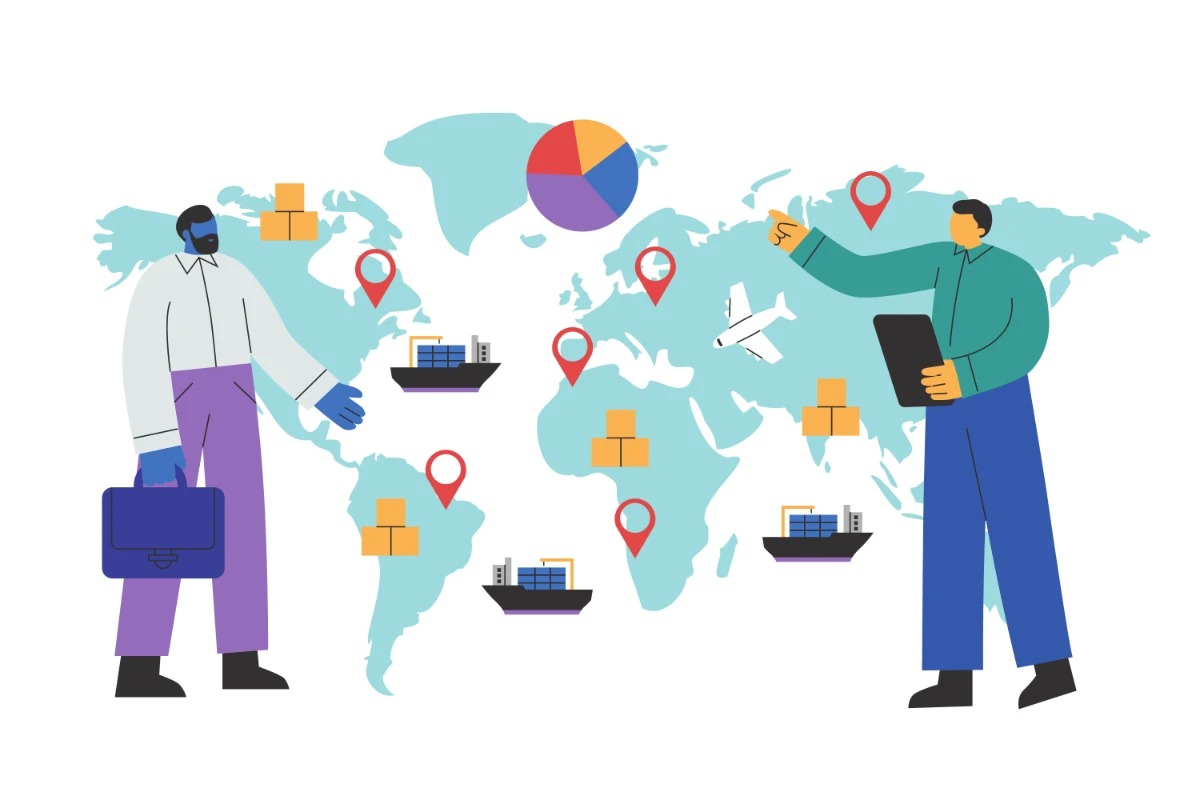
Understanding the real cost behind customs broker fees is a pertinent issue for entrepreneurs and beyond as realities of international trade and logistics become quite tangled. Daunt obstinately strolls through the complexities of customs broker costs is unimaginably impossible without an understanding of the process. In this regard, we are going to discuss the subtle details related to importing cars into the territory of the US and Canada and focus on both the best practices and services that allow a stress-free process.
Decoding Customs Broker Fees: What You Need to Know
The customs broker fees are the fees that are levied as a result of the priceless services provided by the professionals who enable the tough but necessary process of bringing in goods from across the international borders.
These fees encompass an expansive array of activities, which are crucial for smooth trading operations, from very detailed documentation preparation and submission to constant compliance with customs regulations that must seem to change each and every day.
These costs are of crucial significance for importers since they represent one part of the total amount of money spent on the complicated and long route of the goods into a new state. The detailed breakdown of customs broker fees, therefore, should be understood completely, including a deep understanding of diverse elements inclusive of handedness fees, entry fees, and disbursing fees.
Navigating Customs Broker Costs: A Deep Dive into Import Expenses

The fees that encompass customs brokerage services that are commonly charged vary between 0.5% to 2% of the value of the imported products including:
Goods Type & Complexity
The complexity and nature of imported goods are pivotal in determining customs broker fees. Specialized handling, documentation, and permits required for certain products, like hazardous or perishable items, can lead to higher fees.
Goods Value
The declared value of imported goods directly influences customs broker fees. Charged as a percentage of the declared value, higher-value shipments incur greater fees. Accurate reporting of goods value is essential for importers to avoid penalties and ensure precise fee assessments.
Documentation & Compliance
The volume and intricacy of required documentation impact customs broker fees. Importers must furnish various documents, and extensive requirements may lead to higher charges.
Geographic Location
The proximity of a customs broker’s office to the port of entry can affect fees. Brokers in major port cities or high-import traffic regions may have different fee structures. Proximity to customs authorities and familiarity with local regulations can contribute to more competitive pricing in certain cases.
The exchange rate
The exchange rate between the importer’s currency and the currency of the country where the goods are being imported can also affect the cost of customs brokerage services.
The urgency of the shipment
When urgency is a priority, expedited processing becomes essential for timely customs clearance. This service incurs additional fees, justified by the dedicated resources and prompt action required to ensure swift delivery.
Importing Essentials: The Breakdown of Customs Broker Charges and Services

Actual Custom broker fees
1. Core Brokerage Charge
The basic Brokerage fee is the main cost that the customer pays in this service. This cost includes such important functions as the preparation of the required documents, the filing of the customs declarations, the interaction with the customs bodies, and staying within the constraints of the import rules. Customs Brokers’ pricing in regards to the core brokerage fee varies among its suppliers is usually a negotiable fee that ranges between $50 – $150 or more depending on the broker and the complexity of the clearance process.
2. Document Preparation Charge
CBP does not have real harsh fees when it comes to the brokerage sector but can impose the entry preparation fee for the time spent preparing and sending what the custom could request to CBP. This rate is dependent on the complexity and number of documents required, which in most cases comes within the low of $ 50 to $ 100 and above.
3. Merchandise Processing Fee (MPF)
The MPF, mandated by the U.S. Customs and Border Protection on most imports entering the United States, is calculated as a percentage of the declared value of the merchandise. Although not a customs broker fee, brokers may incorporate it into their services and manage its payment on behalf of the importer. Generally set at 0.3464% of the entered value, the MPF includes a minimum fee of $31.67 and a maximum fee of $614.35 per entry.
4. Duties & Taxes
Duties and taxes, distinct from customs broker fees, are expenses tied to importing goods. Customs brokers, however, can aid in computing these costs and facilitate their payment to the relevant authorities on behalf of the importer.
5. Expense Disbursement Charges
Customs brokers may assess disbursement fees to offset their costs for settling duties, taxes, and other associated fees on behalf of the importer. These fees encompass handling charges and, in some instances, interest if the broker advances funds for expense coverage before reimbursement. Ranging typically from $15 to $50, these fees address the disbursement process.
6. Supplementary Service Charges
Customs brokers might charge other fees for special services or special cases. These might be storage fees, fees related to inspection, or fees related to specific documentation requirements. These extra service fees have a tendency to vary greatly among different customs brokers.
Services Offered by Customs Brokers
1. Compliance Assurance
The customs broker is well versed in customs regulation and will also have recent updated information regarding the import and export control and your shipments will conform with all the requirements. This prevents being late on payments, which would result in penalties and/or possible lawsuits.
2. Streamlined Clearance Process
The customs clearance process is effectively simplified with the engagement of the Customs brokers who process the required paperwork, file declarations, communicate with relevant customs authorities and ensure compliance with all the legal requirements. This eliminates both time and resources being wasted in fundraising and thus allows you to concentrate on the core functions of business.
3. Risk Mitigation
Customs brokers may aim at preventing risks related to importing commodities through identifying and minimizing the likes of incorrect classification, valuation disparities or failure to comply with auction or import quotas. They can also mediate for good rates of duty and exemptions.
4. Timely Delivery
Customs brokers remove the slow-down factor that always occurs as a result of the customs process of releasing shipments, by getting releases in good time for your goods. This minimizes the chances of holding service due to delays, which may disrupt your Supply chain and lead to your customer satisfaction.
5. Cost Savings

While customs brokerage fees, import broker fees, and car shipping company costs may seem like an added cost, the value they provide can far outweigh these expenses. By ensuring compliance, minimizing risks, and expediting the clearance process, customs brokers can help you save money on potential penalties, storage fees, and lost sales due to delayed shipments.
6. Product Categorization
Customs brokers engage in the classification of merchandise based on the Harmonized System (HS) codes. These codes, integral to determining applicable tariffs and import regulations, are pivotal for ensuring precise duty and tax evaluations.
7. ISF Submission
The Importer Security Filing (ISF) stands as a mandatory prerequisite for ocean shipments in the United States. Customs brokers play a pivotal role in fulfilling this requirement by submitting the ISF on behalf of importers. This entails furnishing vital information about the goods, encompassing details about the shipper, consignee, and container contents. The accuracy of ISF filing holds paramount importance in upholding supply chain security.
Cost vs. Benefit: Demystifying Customs Broker Fees for Importers
Unraveling customs broker fees is crucial for informed international trade decisions, ensuring regulatory compliance and a smooth import process. This knowledge empowers businesses, enhancing cost-effectiveness and efficiency in navigating customs clearance complexities.
Cost Management: Importing goods incurs various expenses, with customs broker fees being a significant component. A clear understanding enables importers to create precise financial plans, preventing financial surprises and ensuring adequate funds for customs brokerage costs while maintaining a healthy profit margin.
Compliance & Accuracy: Precise reporting of imported goods’ value is vital for customs compliance. Knowing customs broker fees encourages accurate information submission, reducing the risk of audits, fines, or penalties. It promotes adherence to legal requirements, fostering a positive relationship with customs authorities.
Service Evaluation: The responsibilities as well as the charges for services that the different customs brokers provide are not the same. Consequently, genuine importers can determine how and why they should pay and how the vendors receive value from such payments. They can assess and make comparisons to costs and pick a broker based upon required features within their price range.
Transparent Transactions: This clarification as to what the customs broker fees is to improve the transparency of the importation process. The prevention of possible misunderstandings and disputes are made through mutual agreement on terms. This transparency therefore creates an environment of teamwork and also promotes efficiency.
Profitability & Decision-Making: The knowledge of customs broker fees is more detailed, and it enables importers to judge the overall profitism. Including all costs including customs brokerage makes economic rational decisions to ones sourcing, pricing and inventory control. This decision-making, therefore, helps to ensure a sustainable business that will in turn translate to long-term profits and growth.
Making Informed Choices: Understanding the True Value of Customs Broker Services
Navigating the intricate world of international trading relies on balancing cost and benefit, especially when it comes to custom fees. Understanding the implications for importers helps demystify these cross-border payment aspects. Recognizing the nuances between costs and benefits is crucial for making informed choices in import operations.
Evaluating the pros and cons aids importers in realizing the importance of expertise and administrative work associated with custom brokers and car shipping companies. A thorough comprehension of real costs empowers importers to navigate customs broker fees efficiently. Despite challenges, the ability to maneuver this delicate balance transforms customs broker and car shipping company charges into opportunities for international trade. Gain advantage from custom brokers in Border123 and make good the fragile nature of cost versus benefit smoothly and successfully, and cost-effectively, cross-border moving money today.
Frequently Asked Questions
What are the typical components of customs broker fees?
Customs broker fees may include handling fees, entry fees, and disbursement fees, among others.
How do import broker fees differ from customs broker fees?
Import broker fees cover a broader range of services, including logistics and coordination throughout the entire importation process.
What factors influence car transport costs when importing vehicles?
Vehicle type, transportation method, and distance traveled are key factors influencing car transport costs.
How can importers reduce customs broker fees for car shipping?
Strategies such as selecting the right car transport service, optimizing shipping routes, and consolidating shipments can help minimize costs.
What are the key things to consider when importing a car?
Total costs beyond customs fees, government regulations, shipping logistics, compliance requirements, potential delays.


